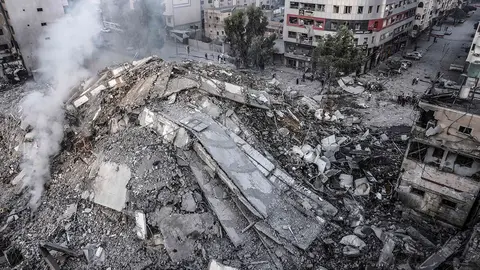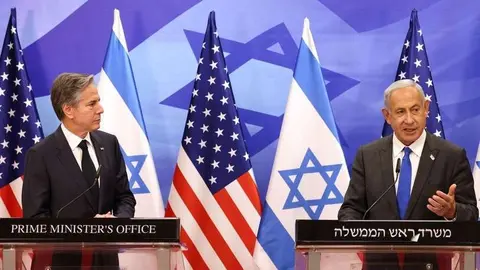Rafah crossing will reopen as Israel finalises preparations for incursion into Gaza

Tension continues to rise in the area a week after the start of the war between Israel and Hamas. In addition to the Gaza Strip and surrounding areas, hostilities have expanded to the northern front, on the border with Lebanon. In recent days, groups such as the Iranian-backed Hezbollah and Palestinian factions have launched rocket attacks on Israeli territory. For this reason, the Israel Defence Forces (IDF) have massed near the border, moving tanks and evacuating civilians from more than 20 communities in the air.
Israel has also attacked militia positions in the area, resulting in the death of a Reuters journalist on Friday. Other reporters from AFP, Reuters and Al Jazeera were also injured in the incident. The IDF has already warned of a "deadly" response if Hezbollah continues its provocations.
"We have increased our forces on the northern border and we respond aggressively to any activity against us," said IDF spokesman Rear Admiral Daniel Hagari. "If Hezbollah dares to test us, the reaction will be deadly. The US is giving us its full backing," he added.
Meanwhile, in the south, sirens continue to sound near Gaza. Authorities are also working to evacuate Sderot, which has taken 75 direct hits since the start of the war, the city's deputy mayor, Elad Kalimi, told The Times of Israel. Kalimi estimated that about two-thirds of the city's 30,000 citizens have already been evacuated. Only 10% are expected to remain in the town. The evacuation of Sderot as well as communities near Lebanon has been celebrated in Iranian media.
Rocket impact in Ashkelon, no injuries reported. pic.twitter.com/ALEMJn9e4b
— Emanuel (Mannie) Fabian (@manniefabian) October 13, 2023
Meanwhile, the offensive against Gaza continues and the IDF is finalising preparations for its "coordinated attack from air, sea and land". Over the weekend, Israeli air strikes have eliminated several senior Hamas leaders, including Muataz Eid, head of national security for the terrorist group's southern district, as well as Bilal el Kedra, the ringleader of the incursions into Israel. Hamas and Palestinian Islamic Jihad infrastructure has also been destroyed.
However, Israeli bombardment has also killed more than 2,500 Gazans, according to the Hamas-controlled Gaza Ministry of Health. The terrorist group has also been accused of using its own civilians as human shields, placing weapons and commanders in residential buildings, hospitals or schools. In addition to eliminating terrorists and destroying key infrastructure, Israel is stepping up its efforts to try to locate hostages kidnapped in Gaza.
#IDF 🇮🇱 nightly strikes on Hamas' terror positions in northern Gaza, IDF channel reports that a number of Hamas terrorists were eliminated. pic.twitter.com/Yd0Mp9Hsok
— Aleph א (@no_itsmyturn) October 16, 2023
"We will not carry out an attack that endangers our people," Rear Admiral Daniel Hagari said, adding that an estimated 200 people - including foreigners - have been held by the terrorist group since its brutal attack on Israel last weekend. As a result of the incursion, more than 1,300 Israelis have been killed and hundreds wounded.
Since Friday, the Israeli army has been urging residents of northern Gaza to evacuate to the south. According to figures provided by Hagari, more than 600,000 Palestinians from Gaza City have already moved south despite Hamas' attempts to prevent people from leaving the north. Once again, Hamas chief Ismail Haniyeh has ordered Gazans to reject "displacement". "No to displacement from the West Bank, no to displacement from Gaza and no to displacement from Gaza to Egypt," the terrorist group's leader declared in a televised speech from Qatar.
BREAKING
— Yashar Ali 🐘 (@yashar) October 14, 2023
The Islamic Republic's Foreign Minister Hossein Amir-Abdollahian met with Hamas leader Ismail Haniyeh in Qatar tonight.
This was first reported by media outlets controlled by the Supreme Leader of the Islamic Republic. pic.twitter.com/9CUX4jP1Ps
In an effort to get the population of the Palestinian enclave to move south, Energy Minister Israel Katz announced that water would start flowing again to the south. Since the war began, Israel has imposed a total blockade on the Gaza Strip, cutting off electricity and preventing supplies from entering.
In addition to water, humanitarian aid is expected to arrive in southern Gaza after the reopening of the Rafah border crossing between the Palestinian enclave and Egypt was announced. "We are putting in place with the United Nations, with Egypt, with Israel and with other parties a mechanism to get assistance to the people who need it," said US Secretary of State Antony Blinken, who has returned to Israel after his visit last week. In addition to humanitarian assistance, the evacuation of foreigners in Gaza through Rafah is planned.










